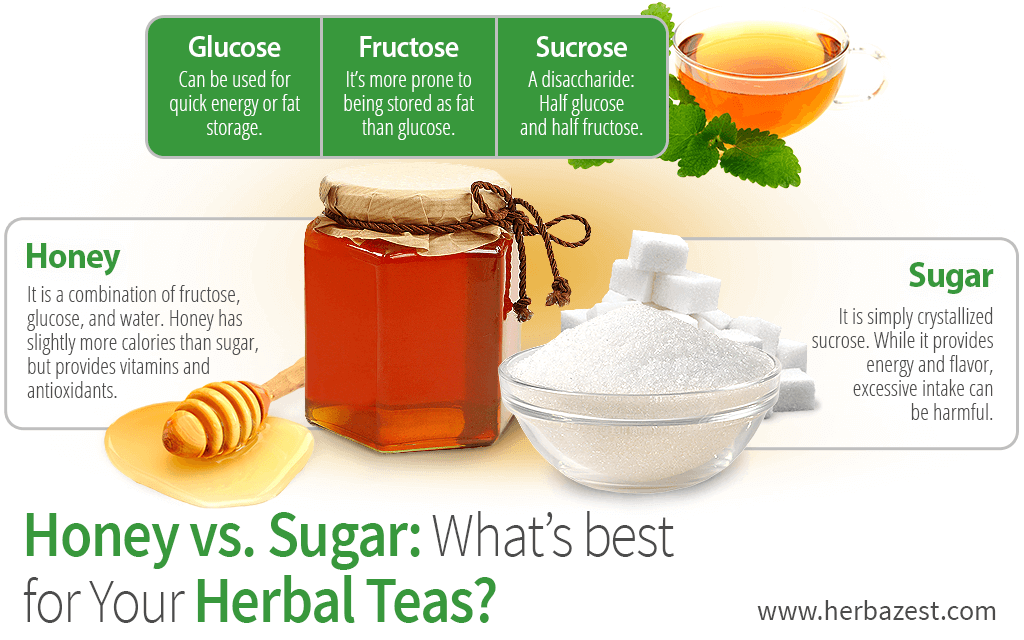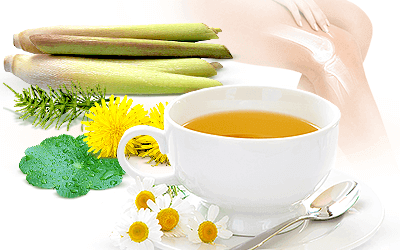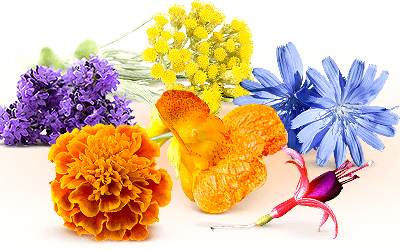Herbal teas are great for so many different ailments that you may hesitate to sweeten them. When you consume them for medicinal purposes, you may wonder if putting sugar will counteract the positive effects of your infusions. There is nothing wrong with making your tea more of a treat, especially when drinking bitter herbs. Learn the distinctions between honey and sugar to decide which one may be better for your needs.
Understanding Sweet
When collecting nectar from flowers, honeybees visit 50 - 100 flowers each trip.
The three most common carbohydrates that are considered to be simple sugars include: sucrose, fructose, and glucose. Although you can't notice the difference taste-wise, they each have a different effect on your body.
Fructose. This unit is a monosaccharide, meaning it is a one-sugar molecule. This carbohydrate is translated into the body mostly as fat and can cause liver issues and weight gain when consumed in excess.
Glucose. This monosaccharide is important for your body's energy levels. It helps circulate blood and store energy in muscle cells for later use.
Sucrose. Sucrose is a disaccharide, meaning it is a combination of two separate sugar molecules: fructose and glucose. When consumed, the two molecules separate; glucose will be used for energy, and fructose may become fat.
Sugar
Sugar, table sugar, brown sugar, granulated sugar - however you call it - is simply crystallized sucrose. It is about half glucose and half fructose. This means that while it is providing energy and flavor, large amounts can also turn into fat.
One serving of sugar is about two teaspoons. In that amount, there are about 31 calories and 8 grams of sugar. Because table sugar is so processed, you will not find the healthy nutrients that you would in the sugar canes or beets that they come from. You may have even heard of sugar being referred to as "empty calories," meaning that they are calories with not much nutritional value.
Honey
Honey, on the other hand, has the potential to provide more nutrition. This sweet, golden substance that bees work so hard to make is a combination of fructose, glucose, and water. About 82% of honey is sugar. It contains trace amounts of vitamins and minerals, and it is loaded with antioxidants. The darker the honey, the more antioxidants it contains. Furthermore, honey is typically highly acidic, which – combined with its thick consistency – gives it a very mild antibiotic potential.
A serving of honey is three teaspoons. Therein, you will find about 64 calories and 17 grams of sugar. Although it has a lower glycemic index than sugar - meaning honey does not make blood sugar levels rise as quickly as sugar does -, it is still not the most suitable option for diabetics.
A bit of honey or sugar in your tea won't hurt, but you may want to weigh in your options. Although honey has more calories, it provides minerals and antioxidants than sugar. Both have high levels of fructose, which may be stored in the body as fat. All things considered, many people prefer honey due to its ability to better complement the flavor and medicinal benefits of herbal tea.
Bibliography:
Bogdanov, S. et al. (2008). Honey for Nutrition and Health: A Review. Journal of the American College of Nutrition, 27(6), 677-689. Retrieved from http://www.ncbi.nlm.nih.gov/pubmed/19155427
Evert, A. (2011). Sweeteners - Sugars: MedlinePlus Medical Encyclopedia. Retrieved February 27, 2014, from http://www.nlm.nih.gov/medlineplus/ency/article/002444.htm
- Mandal, M., Mandal, S. (2011). Honey: its medicinal property and antibacterial activity. Asian Pacific Journal of Tropical Biomedicine. April 2011; 1(2): 154-160






